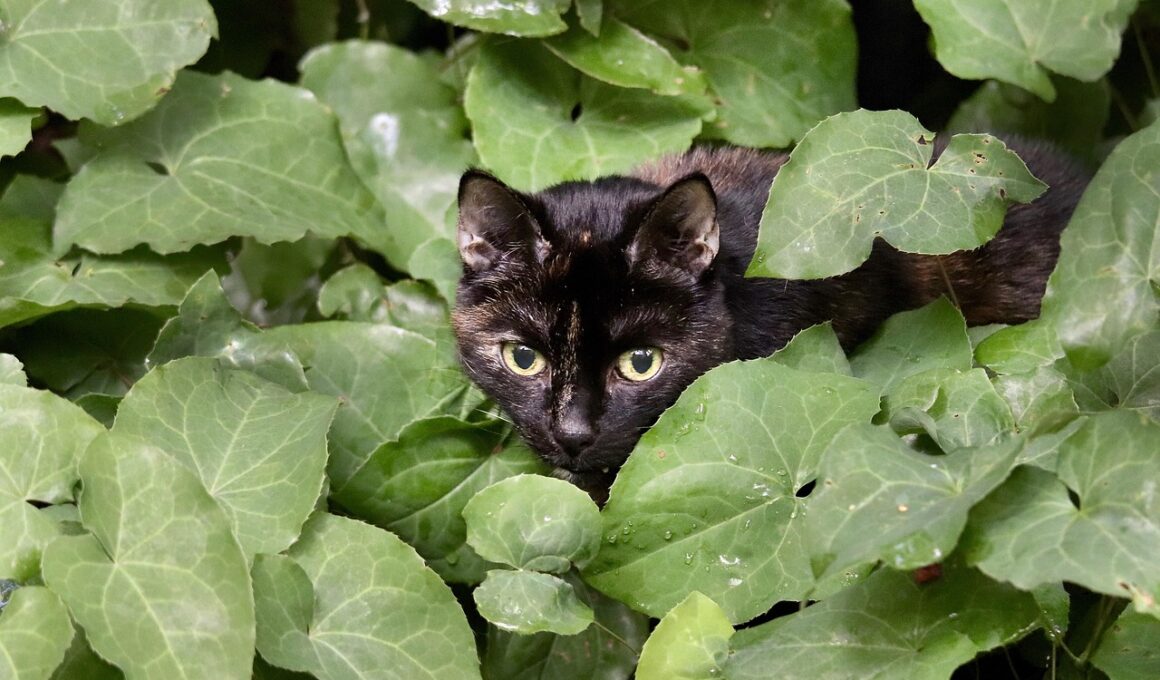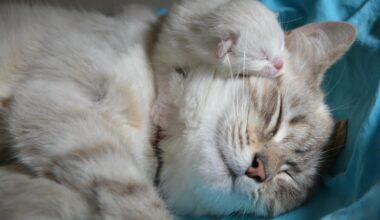Vitamins and Commercial Cat Food: Myths and Facts
A common misconception about commercial cat food is that it contains all the necessary vitamins and minerals that our felines need. Many cat owners believe that as long as they are purchasing well-known brands, they need not worry about their pet’s vitamin intake. However, this myth can lead to nutritional imbalances in a cat’s diet. Not all commercial cat foods are created equal, and the quality of vitamins can vary significantly. Natural sources of vitamins, such as meats and fish, are often richer compared to synthetic additives used in some cat foods. Cats have specific dietary requirements, which include essential vitamins like A, D, E, and B-complex. A lack of these vitamins can lead to serious health issues, including skin problems, impaired vision, and weakened immune function. It’s crucial for cat owners to read labels and ensure they provide a balanced diet, which includes high-quality commercial cat food alongside fresh ingredients. Consulting a veterinarian about the right vitamin supplementation is advisable to ensure optimal health for your furry companions.
When delving deeper into the vitamins found in commercial cat food, it’s essential to differentiate between essential and non-essential nutrients. Essential vitamins must be included in a cat’s diet, while non-essential ones can be synthesized by the cat’s own body. For instance, Vitamin A is crucial for the maintenance of vision and immune functions in cats. Unlike humans, cats cannot convert beta-carotene from vegetables into Vitamin A. Therefore, supplementation through meat sources found in cat food is necessary. Similarly, Vitamin D helps in calcium absorption, promoting healthy bones and teeth. A deficiency in vitamin D can lead to rickets, making it vital for cat food to include this nutrient. On the other hand, while B vitamins play an important role in metabolism, cats usually synthesize these efficiently. However, stressed cats might require additional intake. It’s beneficial for cat owners to be informed about these vitamins to understand their pet’s dietary needs better. Many enriched foods claim to offer specific vitamin profiles, but scrutinizing ingredients and consulting with veterinarians is crucial for proper dietary choices.
Understanding Synthetic vs. Natural Vitamins
In commercial cat foods, vitamins can be derived from either natural or synthetic sources. Natural vitamins are extracted from foodstuffs or food-grade materials, while synthetic ones are chemically manufactured. There’s ongoing debate among pet owners and veterinarians regarding which type is healthier for cats. Many pet parents believe natural vitamins are superior as they often come with co-factors and enzymes that assist in absorption. However, synthetic vitamins can be just as effective if they are appropriately formulated and dosed. For instance, both sources provide Vitamin E, but the bioavailability might differ. The digestive systems of cats can absorb synthetic vitamins, but some argue that pets thrive better with natural variants. It’s crucial to read labels carefully. Look for products that specify the vitamin sources as this can give insight into their quality. Ultimately, the right choice may hinge on the individual cat’s needs, age, and health status. A veterinarian will provide tailored advice and recommendations suited to each cat’s unique dietary requirements for optimal well-being.
Another aspect worth considering is the impact of heat treatment during the manufacturing of commercial cat food. High temperatures can degrade vitamins and reduce their effectiveness, potentially leaving the finished product deficient. Therefore, exploring brands that prioritize nutrient preservation is vital. Many premium cat foods are designed using careful cooking techniques that better retain vitamins. Additionally, some manufacturers add vitamins after cooking to ensure that they remain effective and beneficial. Understanding these manufacturing processes can help pet owners make more informed choices about their cat food. Seek out products that emphasize their commitment to preserving nutritional value. Always look for brands with a good reputation and quality assurance processes. The nutritional adequacy statement on the label can also offer insights into the vitamin content and overall quality. Understanding the manufacturing practices can create a significant impact on your pet’s health and nutrition. This awareness allows owners to select diets that contribute to the overall well-being and longevity of their beloved cats.
The Role of AAFCO in Cat Food Vitamins
The Association of American Feed Control Officials (AAFCO) provides guidelines for formulating pet foods, including the vitamin content required. Their nutrient profiles help manufacturers formulate their products to ensure they meet certain standards for feline nutrition. Products labeled as ‘complete and balanced’ must adhere to these AAFCO standards. This institution outlines specific recommendations for vitamins and minerals necessary for cats at different life stages. For instance, kittens require higher levels of certain vitamins for growth and energy compared to adult cats. AAFCO specifications can help pet owners verify that a product meets fundamental nutritional criteria. However, it’s also essential for owners to take personal responsibility by scrutinizing these guidelines. This ensures the brand they choose doesn’t just conform to the minimum requirements but also offers high-quality nutrients. Engaging with brands that prioritize tailored nutritional formulations can enhance your cat’s vitality considerably. This includes ensuring that vitamins are included within beneficial ratios. Therefore, whenever choosing cat food, keep AAFCO guidelines in mind to prevent potential deficiencies in your cats’ diet.
A common question arises around whether cats can receive adequate vitamins solely from a diet of commercial cat food. While many premium brands significantly enhance their formulas with vitamins, they may still lack adequate amounts in certain cases. Factors influencing vitamin levels include the specific recipe, ingredient quality, and even the processing methods. Hence, while a high-quality cat food can cover nutritional bases, it may not fulfill all of a cat’s vitamin needs. Some cats, especially those with health issues or special dietary requirements, might benefit from additional vitamin supplements. Supplements can be beneficial, but care should be taken in dosage and selection. Not all formulas are safe for all cats, so consulting with a veterinarian provides an essential perspective. They can recommend tailored supplements that can complement your cat’s primary diet effectively, ensuring no deficiencies arise. By understanding the overall nutritional landscape, cat owners can feel empowered to provide balanced diets that support the health and happiness of their pets over time.
Conclusion: Ensuring Optimal Vitamin Intake
To summarize, selecting the right commercial cat food is paramount for ensuring adequate vitamin intake in felines. Understanding the labels and the source of vitamins, whether synthetic or natural, helps guide better nutritional choices. Additionally, engaging with quality brands that prioritize preserving vitamin integrity through careful manufacturing processes is equally important. Owners should also consider consulting with veterinarians to address their unique pet’s dietary needs and any requirements for supplementation. Every cat is different; hence their dietary necessities can vary widely based on age, activity level, and health conditions. By remaining informed about the myths and facts surrounding vitamins in commercial cat food, owners can significantly enhance their pets’ health and vitality. Ensuring they receive all essential vitamins will lead to happier, healthier feline companions. Ongoing education about nutrition is fundamental for fostering long-term health and well-being. Therefore, stay proactive, conduct thorough research, and make informed dietary decisions to keep your furry friends thriving for years to come.
Providing the best nutrition for our cats ensures they lead healthy, vibrant lives filled with joy and activity.


